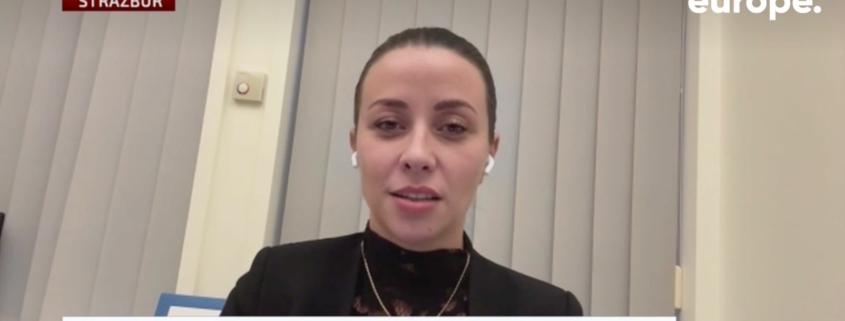In an interview with Serbian N1 on Wednesday, September 10, 2025, MEP Irena Joveva spoke about the situation in Serbia and how, although still too slowly, the EU’s attitude towards Serbia is changing. “Anything is possible if there is political will. There are mechanisms in the European Parliament and there are other things we can and will do,” Joveva was candid about the approaches available to the Union.
“I was not surprised that Ursula von der Leyen did not mention Serbia in her speech, because it was not expected. However, we need to look at the bigger picture and the circumstances. Von der Leyen has spent years building an image of a leader who can lead the EU through various crises, but now she has experienced a serious drop in credibility. For example, after 700 days she mentioned Gaza for the first time in her speech. So the reason for the drop in her credibility is also that she does not have a position on Serbia,” MEP Irena Joveva told N1.
However, according to Joveva, this does not change the fact that MEPs in the European Parliament, including Commissioner Marta Kos, will do everything they can for Serbia.
“The position of Commissioner for Enlargement Kos is her position. Marta Kos has, for legitimate reasons, intensified her rhetoric towards official Belgrade. If we look at the situation and everything that is happening in Serbia, and the statements of Marta Kos, it is clear that Von der Leyen knows very well what she is talking about. And besides the fact that Ursula Von der Leyen always knows what Marta Kos is going to say, this actually means that something is happening and that this is the beginning of a different official position of the European Commission towards Serbia.”
She said, that she is convinced, that von der Leyen would have to choose between economic and human, democratic interests, and that the fact, that she did not mention Serbia in her last speech, did not mean that her position was not changing.
“I think her attitude is changing, because Marta Kos would never make such statements about Serbia without Von der Leyen knowing about them,” the MEP was of the opinion.
When asked what was crucial and what influenced the change of direction of the MEPs and the European Commission towards official Belgrade, Joveva was clear:
“Things have gone too far in Serbia and it is simply impossible to ignore this anymore, even if it concerns high-ranking officials of the European institutions. All this has been going on in Serbia for a long time. Ursula said something about Gaza for the first time in 700 days, but when I say that, I don’t think she will need that much for Serbia. The fact is that something is changing, so our pressure and the pressure of the people in Serbia must not stop. When it comes to the President of Serbia, Aleksandar Vučić, the problem is not only that he cannot control his attitude towards the MEPs. A much bigger problem is the way he treats his people, and I think everyone in Europe is increasingly aware of this.”
Regarding the mechanisms that the European Parliament has to put pressure on the regime in Belgrade and help the students and citizens who are protesting, Joveva explained that she sees politics as the art of the possible:
“Anything is possible if there is political will. There are mechanisms in the European Parliament and there are other things that we can and will do. There will certainly be. Maybe a new resolution, some official mission of the European Parliament to Serbia, pressure or monitoring of the promises of the Serbian authorities, maybe it will be demands regarding financial resources, some form of sanctions, everything is possible. Some of these things are easier to achieve, some are more difficult because we have to get the permission of all 27 member states. But we have to do it.”
She went on to point out that the criticisms we hear from the European Parliament now, carry more weight, because the circumstances in Serbia have changed for the worse.
“We must now take clear steps, put our hands up and not allow the authorities in Serbia to use the EU as a cover. Economic values are still more important than democracy for some individuals, and this is in the European Commission, but this is also changing. It is increasingly clear that Vučić is no longer a factor of stability, not even for Ursula von der Leyen. This is no longer the case, because he has become the source of all instability. Therefore, some economic values are no longer so important. And even if von der Leyen may not personally want to change her attitude towards him, she will have to change that.”
She concluded by saying that she is confident that Serbian students will be included in the first three nominations for the Sakharov Prize. Although it is a proposal by the Renew Europe group of the European Parliament, she is confident that this group is not the only one to have nominated them for the prize, because what they are doing is not only important for Serbia, but for all of us.
The interview is available in full at the following link.




Leave a Reply
Want to join the discussion?Feel free to contribute!